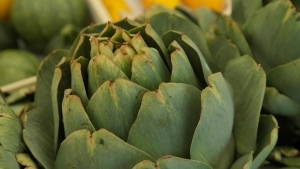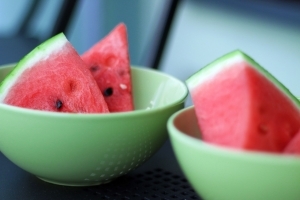Le Baou d’Infer Bouillabaisse
From Alex Mackay's book with photographer Peter Knab, Cooking in Provence (Ebury Press, ISBN 978-0-09-192494-2).
As many versions as I have eaten, I have tried to cook more. This is a much refined version that has proved the simplest to eat and serve and the most adaptable to the different types of fish available in different countries.
We started serving a ‘true’ bouillabaisse, but some of the guests, a little less keen, were defeated after 10 minutes or so of politely grimacing through little bones which they picked from their teeth. I was of course greedily sucking at every carcass, licking my fingers between each attack, but a single glance upward told me that work was needed to make the bouillabaisse a success.
I then started to fillet the fish and make the broth similar to the recipe that I have laid out here. The broth was then strained and I poached the fish in a series of pans depending on its type before being lifted out on to trays and portioned. Lifting out fish fillets that cook through in a flash is somewhere between walking on a tightrope and eggshells, so quickly do they break up. I ended doing as I suggest here, baking the marinated fish fillets in stock in their portions, which makes for great ease of serving.
If you want to serve the fish after the soup, you can easily put it in a big serving dish or in individual portions as you prefer; it can happily go into the oven as you take out the soup. From the pleasure point of view, though, I most enjoy serving it all at once.
If you can’t get all of the different varieties of fish, you can still make a wonderful dish with just one or two. Get your fishmonger to scale, gut and fillet the fish, keeping all of the heads and bones for you.
(Serves 6)
Ingredients
- 2.5kg filleted mixed rockfish, monkfish, scorpion fish, John Dory, sea bream, gurnard (if you can); plus heads and bones
- 1 tsp saffron threads
- 100ml olive oil
- salt and cayenne pepper
- 36 mussels
- 12 large tiger prawns
- 1 large onion, peeled and chopped into dice of about 3cm
- 1 large fennel bulb, chopped into dice of about 3cm
- 6 garlic cloves, peeled and finely chopped
- 2 plum tomatoes, chopped into dice of about 3cm
- 1 level tbsp tomato concentrate
- 3 strips dried orange zest
- 600g small potatoes, scrubbed and thickly sliced
To Serve
- 1 quantity Rouille
- Croutons, sliced from a baguette, brushed with olive oil and baked till crisp
Method
Pre-heat your oven to 190°C/375°F/Gas 5
Check the fish for scales and remove if necessary. Cut the fish into even-sized pieces and mix well with half the saffron and olive oil, and a good sprinkling of salt and cayenne pepper. Set aside until needed.
Rinse the mussels in cold water then remove the beards from the bases of the shells by pulling them upwards towards the fat part of the mussel and out. Any mussels that may have opened, tap lightly, and if they do not close, discard them. Halve the prawns lengthways.
Sweat the onion, fennel, garlic and tomatoes in the remaining olive oil for 10 minutes over a low heat until soft but not coloured. Raise the heat, add the tomato concentrate and cook, stirring constantly, for a few minutes until it browns lightly. Add the fish heads and bones, the remaining saffron and the orange zest. Cover with water, bring to the boil and boil rapidly for 20 minutes, topping up the water if necessary. Strain bit by bit, first of all through a colander, bashing the bones and shells with the back of a ladle to extract every last bit of flavour. Taste, then reduce the broth a little if necessary.
Salt the fish, then lay it and the prawns flat on a couple of lipped oven trays. Pour over some of the broth, and cook in the preheated oven for 10 to 15 minutes. At the same time, cook the potatoes in a little of the broth and when they are almost cooked, add the mussels, cover with a lid and boil quickly to open. (Discard any mussels that remain closed.)
Strain the broth from the potatoes and mussels into the bulk of the broth, and bring to the boil. Whisk about a third of it into half the rouille. Be sure to keep whisking until the rouille is well combined and keep well away from the heat as the egg in the mixture will scramble if boiled. Pour back into the pot with the remaining broth and whisk together well.


